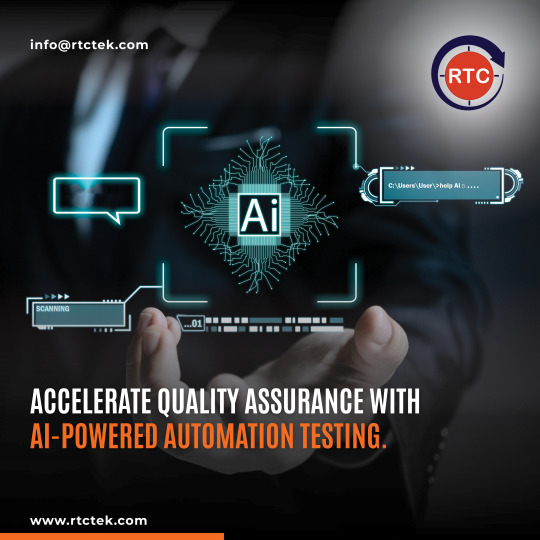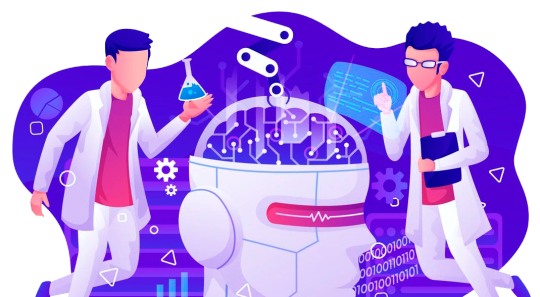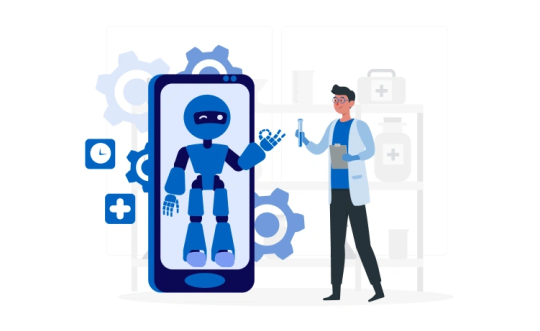#aipoweredautomation
Text

We utilize cutting-edge AI algorithms to revolutionize testing practices, increase efficiency and accuracy at every step. Through AI-powered test automation, we streamline diverse testing tasks, from generating test cases to optimizing test coverage. This helps us find and fix problems before they cause bigger issues. This test automation approach continuously learns and adapts to the changing digital environment. This allows us to maintain robust testing procedures even in the face of dynamic software environments. As a result, our clients experience accelerated time-to-market for their products and enjoy a higher level of product quality, ensuring that they can confidently launch their software with the assurance of its reliability and performance.
Explore our comprehensive Test Automation Services at https://rtctek.com/automation-testing-services.
Connect with our experts at https://rtctek.com/contact-us/.
#rtctek hashtag#roundtheclocktechnologies hashtag#automationtesting hashtag#testautomation hashtag#testautomationservices hashtag#automation hashtag#aipoweredautomation
0 notes
Text
Unleashing the Power of Cognitive Process Automation
In today's fast-paced business environment, organizations are constantly seeking innovative ways to streamline their operations, reduce costs, and improve overall efficiency. One such solution that has gained significant traction in recent years is Cognitive Process Automation (CPA). By harnessing the power of artificial intelligence (AI), machine learning (ML), and natural language processing (NLP), CPA is revolutionizing traditional process automation, enabling businesses to automate complex cognitive tasks that were previously thought to be impossible. In this blog post, we will explore the concept of cognitive process automation, its benefits, and its potential impact on businesses across various industries.
Understanding Cognitive Process Automation:
Cognitive Process Automation refers to the use of AI technologies to automate tasks that involve cognitive abilities, such as problem-solving, decision-making, natural language understanding, and learning. Unlike traditional process automation, which primarily focuses on automating repetitive, rule-based tasks, CPA enables organizations to automate more complex processes that require human-like cognitive skills.
Key Components of Cognitive Process Automation:
Artificial Intelligence (AI): AI technologies, such as machine learning and deep learning algorithms, form the foundation of CPA. These algorithms enable systems to learn from data, identify patterns, and make intelligent decisions.
Machine Learning (ML): ML algorithms allow systems to automatically improve their performance and decision-making abilities over time, without explicit programming. By analyzing large volumes of data, ML models can recognize complex patterns and make predictions or recommendations.
Natural Language Processing (NLP): NLP enables computers to understand, interpret, and generate human language. With NLP, CPA systems can comprehend and respond to natural language queries, extract relevant information from unstructured text, and even generate human-like written content.

Benefits of Cognitive Process Automation:
Enhanced Efficiency: By automating cognitive tasks, CPA eliminates human error, reduces processing time, and enhances overall operational efficiency. This allows employees to focus on higher-value activities, such as innovation, creativity, and customer engagement.
Improved Decision-Making: CPA leverages advanced algorithms to analyze vast amounts of data and generate actionable insights. By automating decision-making processes, organizations can make more informed and data-driven decisions, leading to improved outcomes and competitive advantages.
Scalability and Flexibility: Unlike human workers, CPA systems can operate 24/7 without fatigue or downtime. This enables organizations to scale their operations rapidly, handle increased workloads, and adapt to changing business requirements with ease.
Cost Savings: By automating cognitive tasks, organizations can significantly reduce labor costs associated with repetitive, time-consuming processes. Additionally, CPA minimizes the risk of errors and rework, resulting in cost savings and improved resource utilization.
Enhanced Customer Experience: With the ability to analyze customer interactions and preferences, CPA systems can deliver personalized and tailored experiences. This leads to improved customer satisfaction, loyalty, and ultimately, increased revenue.

Potential Impact on Industries: Cognitive Process Automation has the potential to transform various industries, including:
Banking and Finance: CPA can automate complex financial analysis, fraud detection, risk assessment, and customer support, leading to improved accuracy, compliance, and customer service.
Healthcare: CPA can enhance medical diagnosis, optimize treatment plans, automate administrative tasks, and enable personalized patient care, improving healthcare outcomes and reducing costs.
Customer Service: By automating customer support processes, CPA can provide faster response times, personalized recommendations, and seamless interactions, resulting in enhanced customer satisfaction and retention.
Supply Chain Management: CPA can optimize inventory management, demand forecasting, logistics, and supplier relationship management, improving supply chain efficiency and reducing costs.
Cognitive Process Automation represents a significant leap forward in process automation, enabling organizations to automate cognitive tasks and leverage the power of AI, ML, and NLP. By embracing CPA, businesses can achieve enhanced efficiency, improved decision-making, cost savings, and deliver superior customer experiences. As technology continues to advance, organizations across various industries must embrace the opportunities presented by CPA to stay competitive in the digital age and unlock new levels of operational excellence.
Get in touch today to know more about Cognitive Process Automation
#CPA#CognitiveAutomation#IntelligentAutomation#AIpoweredAutomation#NLPbasedAutomation#RoboticProcessAutomation#MachineLearningAutomation#AutomatingWorkflows#CognitiveBots#AutomationRevolution#SmartProcessAutomation#DigitalTransformation#EfficiencyBoost#AutomateTasks#StreamlineOperations
0 notes